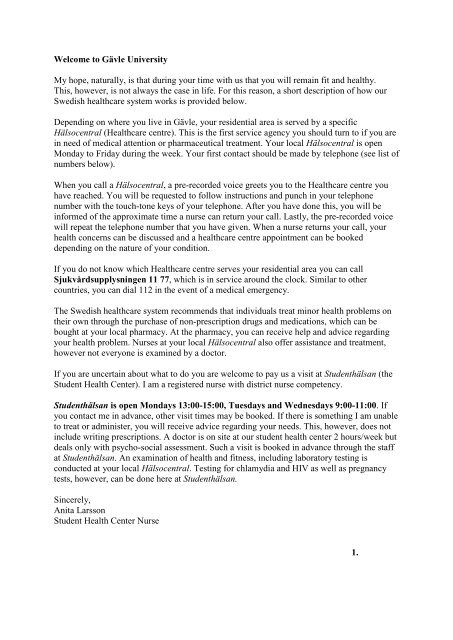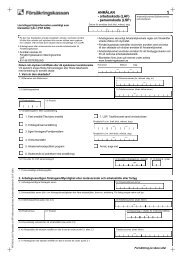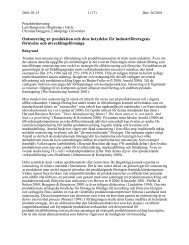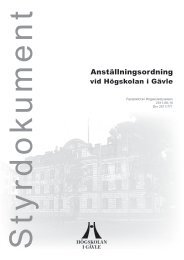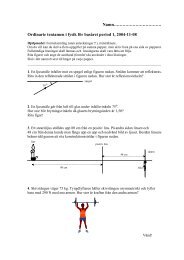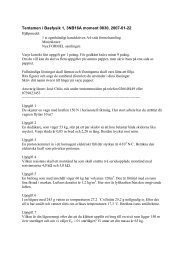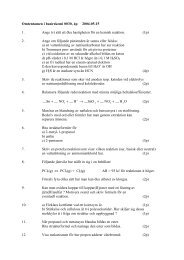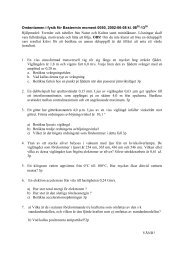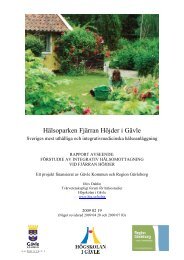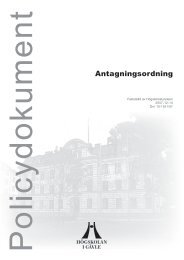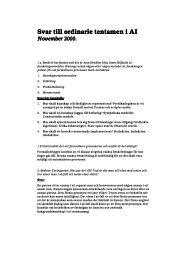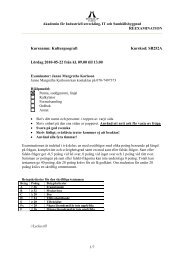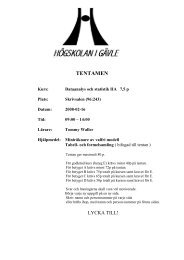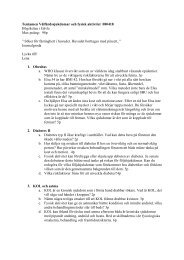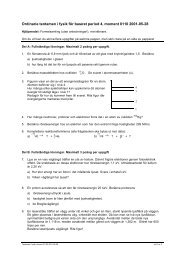Welcome to Gävle University
Welcome to Gävle University
Welcome to Gävle University
Create successful ePaper yourself
Turn your PDF publications into a flip-book with our unique Google optimized e-Paper software.
<strong>Welcome</strong> <strong>to</strong> Gävle <strong>University</strong><br />
My hope, naturally, is that during your time with us that you will remain fit and healthy.<br />
This, however, is not always the case in life. For this reason, a short description of how our<br />
Swedish healthcare system works is provided below.<br />
Depending on where you live in Gävle, your residential area is served by a specific<br />
Hälsocentral (Healthcare centre). This is the first service agency you should turn <strong>to</strong> if you are<br />
in need of medical attention or pharmaceutical treatment. Your local Hälsocentral is open<br />
Monday <strong>to</strong> Friday during the week. Your first contact should be made by telephone (see list of<br />
numbers below).<br />
When you call a Hälsocentral, a pre-recorded voice greets you <strong>to</strong> the Healthcare centre you<br />
have reached. You will be requested <strong>to</strong> follow instructions and punch in your telephone<br />
number with the <strong>to</strong>uch-<strong>to</strong>ne keys of your telephone. After you have done this, you will be<br />
informed of the approximate time a nurse can return your call. Lastly, the pre-recorded voice<br />
will repeat the telephone number that you have given. When a nurse returns your call, your<br />
health concerns can be discussed and a healthcare centre appointment can be booked<br />
depending on the nature of your condition.<br />
If you do not know which Healthcare centre serves your residential area you can call<br />
Sjukvårdsupplysningen 11 77, which is in service around the clock. Similar <strong>to</strong> other<br />
countries, you can dial 112 in the event of a medical emergency.<br />
The Swedish healthcare system recommends that individuals treat minor health problems on<br />
their own through the purchase of non-prescription drugs and medications, which can be<br />
bought at your local pharmacy. At the pharmacy, you can receive help and advice regarding<br />
your health problem. Nurses at your local Hälsocentral also offer assistance and treatment,<br />
however not everyone is examined by a doc<strong>to</strong>r.<br />
If you are uncertain about what <strong>to</strong> do you are welcome <strong>to</strong> pay us a visit at Studenthälsan (the<br />
Student Health Center). I am a registered nurse with district nurse competency.<br />
Studenthälsan is open Mondays 13:00-15:00, Tuesdays and Wednesdays 9:00-11:00. If<br />
you contact me in advance, other visit times may be booked. If there is something I am unable<br />
<strong>to</strong> treat or administer, you will receive advice regarding your needs. This, however, does not<br />
include writing prescriptions. A doc<strong>to</strong>r is on site at our student health center 2 hours/week but<br />
deals only with psycho-social assessment. Such a visit is booked in advance through the staff<br />
at Studenthälsan. An examination of health and fitness, including labora<strong>to</strong>ry testing is<br />
conducted at your local Hälsocentral. Testing for chlamydia and HIV as well as pregnancy<br />
tests, however, can be done here at Studenthälsan.<br />
Sincerely,<br />
Anita Larsson<br />
Student Health Center Nurse<br />
1.
Important telephone numbers:<br />
Maturnity Care Center<br />
Gävle Hospital<br />
Open <strong>to</strong> those over 22 years old who are in need of<br />
contraceptives or are pregnant.<br />
Tel. 026-15 59 70<br />
Monday-Friday 08:00-10:00<br />
Monday-Thursday 13:00-14.30<br />
Gävle Youth Clinic<br />
Open <strong>to</strong> those under 23 years old who are in need of<br />
contraceptives.<br />
Tel- 026-15 55 70<br />
Monday-Tuesday, Thursday-Friday 08:00-09:00<br />
Monday-Thursday 16:00-17:00<br />
Youth clinic for males under 23 years old<br />
Fridays 12:00-14:00<br />
Drop-in for birth control pills<br />
For those who need a new prescription<br />
Monday-Thursday 13:00-15:00<br />
Sex Counselling<br />
Gävle Hospital, entrance 15<br />
Tel. 026-15 42 16<br />
Monday and Thursday 12:00-13:00, 16:00-17:00<br />
Tuesday, Wednesday, Friday 8:30-10:30<br />
Drop-in for males<br />
Thursday 14:00-16:00<br />
Läkarhuset Gävle<br />
(Gävle Medical Building)<br />
Staketgatan 32<br />
Physical therapist/chiroprac<strong>to</strong>r<br />
For those in need of vaccinations or health<br />
certificates<br />
Tel. 026-15 75 60<br />
See Yellow Pages in the telephone book<br />
2.
Hälsocentraler (Healthcare Centres)<br />
Andersberg Hälsocentral 08:00-17:00 tel.026-15 77 00<br />
Bomhus Hälsocentral 08:00-17:00 tel.026-15 77 20<br />
Brynäs Hälsocentral 08:00-17:00 tel.026- 66 23 20<br />
Gävle Hälsocentral 08:00-17:00 tel.026- 66 21 80<br />
Hälsocentralen S<strong>to</strong>r<strong>to</strong>rget 08:00-17:00 tel.026- 15 75 00<br />
Strömsbro Hälsocentral 09:00-17:00 tel.026-15 77 50<br />
Sätra Hälsocentral 08:00-17:00 tel.026-15 77 77<br />
Södertulls Hälsocentral 08:00-17:00 tel.026- 15 55 31<br />
Valbo Hälsocentral 08:00-17:00 tel.026-15 77 80<br />
1. Back pain<br />
2. Catarrh and blocked noses<br />
3. Constipation<br />
4. Coughing<br />
5. Diarrhoea in adults<br />
6. Headaches<br />
7. Heartburn and indigestion<br />
8. Travel- sickness<br />
Information from the social insurance office about dental care<br />
A person that temporary stays in Sweden, even if they are nationally registered, has in most<br />
cases not right <strong>to</strong> get compensation for dental care.<br />
The rules are different between medical service and dental care. You can have more<br />
information at www.forsakringskassan.se. You can also make a call <strong>to</strong> the cus<strong>to</strong>mers<br />
information 0771-524 524
1. Back pain<br />
Ryggvärk<br />
Helpful facts about back pain<br />
Back pain, with or without radiation <strong>to</strong> the legs, is a common problem from which most of us<br />
suffer at some time during our lives.<br />
Back problems can be initiated by incautious movements, by lifting using incorrect techniques<br />
or by excessive strain <strong>to</strong> the back. Sometimes there is no apparent reason for the pain.<br />
In some cases, pain strikes suddenly and this is called a crick in the back or lumbago. The pain<br />
usually goes away within 1 <strong>to</strong> 3 weeks.<br />
In other cases, the pain can creep up on you, lasts a long time and tends <strong>to</strong> reoccur.<br />
When the pain spreads <strong>to</strong> your legs, this is called sciatica. It may be caused by nerve irritation<br />
or a pinched nerve.<br />
When should I seek assistance?<br />
Get in <strong>to</strong>uch with the medical care services if:<br />
• you have severe back pain<br />
• the back pain follows an injury or accident<br />
• you have constant or increased pain during the night<br />
• you have difficulty urinating, retaining urine or bowel movements, at the same time as you<br />
have back pain<br />
• you experience weakness or reduced feeling in your legs or feet<br />
• you have backache in conjunction with a fever<br />
• you have back pain and are very tired or lose weight for no apparent reason<br />
• children below the age of 18 years have back pain<br />
• persistent back pain occurs for the first time after the age of 55<br />
you have tried curing yourself for the first 2 <strong>to</strong> 3 weeks, but have not become better<br />
What can I do myself?<br />
Healing will progress more rapidly if you try <strong>to</strong> keep mobile and basically continue as normal.<br />
During the first one <strong>to</strong> two days, try <strong>to</strong> avoid any movement that causes pain, and similarly avoid<br />
carrying or lifting. If you have pain during the night, you should rest in the position that causes the<br />
least pain possible, for example with your legs raised by a cushion.<br />
How do i prevent back pains?<br />
• Exercise!<br />
• Get yourself in<strong>to</strong> good basic condition by exercising regularly. Choose a form of exercise<br />
that you enjoy (walking, swimming, cycling, skiing).<br />
• You will be able <strong>to</strong> deal with your back problems better if you are in good shape, both<br />
physically and psychologically.<br />
• Build up your muscles! It is good <strong>to</strong> build up abdominal and leg muscles, since you use<br />
them when lifting<br />
• Lift correctly!<br />
Hold the object you are going <strong>to</strong> lift as close <strong>to</strong> your body as possible. This reduces the<br />
strain on your back.<br />
• Teach yourself!<br />
Learn about work techniques and correct working posture. Your district health care centre<br />
or corporate healthcare service will be able <strong>to</strong> assist you.
Are there prescription-free medicines?<br />
When you require temporary relief from back pain, you can take a prescription-free pain<br />
reliever. Dont take more tablets at a time or more often than stated on the package. Higher<br />
doses than those recommended do not increase pain relief. Taking <strong>to</strong>o many tablets every<br />
day can also have serious consequences.<br />
If you have, or have had, an ulcer, asthma or an increased propensity <strong>to</strong> bleed (for<br />
example, get nosebleeds easily), you should take paracetamol, such as Alvedon, Curadon,<br />
Panodil or Reliv. If you do not have any of these problems, you can take a pain relief<br />
tablet containing ibuprofen, such as Alindrin, Ibumetin, Ipren or a tablet containing<br />
acetylsalicylic acid (aspirin), for example Bamyl-S brus or Magnecyl brus.<br />
Termo plaster can be used <strong>to</strong> relieve muscle pain in the affected area, for example the<br />
lower part of the back. These plasters should not be used for children under the age of 12<br />
years.
2. Catarrh and blocked noses<br />
Snuva och nästäppa<br />
Helpfull facts about catarrh and blocked noses<br />
Blocked noses are usually caused by an increase in the flow of blood <strong>to</strong> the mucus membrane in the<br />
nose. The mucus membrane then swells and prevents the passage of air. You will often suffer from a<br />
runny nose at the same time. There are various causes for a blocked nose.<br />
Cold catarrh<br />
It is common <strong>to</strong> have <strong>to</strong> have runny nasal mucus and/or a blocked nose with a cold. This results from a<br />
virus which causes inflammation of the mucus membrane in the nose.<br />
Allergic catarrh<br />
A blocked nose, a runny nose and itching in your nose appearing during the spring and/or summer are<br />
common symp<strong>to</strong>ms of a pollen allergy. If you have this problem throughout the year, it may be caused<br />
by an allergy <strong>to</strong> dust or house mites.<br />
Blocked nose during pregnancy<br />
Hormonal changes can cause increased inflammation of the bodys mucus membranes. Consequently,<br />
many women have a period with blocked noses during pregnancy.<br />
Other causes<br />
Some people have extra-sensitive mucus membranes and easily get runny and blocked noses from, for<br />
example, dust, perfume or smoke. Other causes of blocked noses can be dis<strong>to</strong>rted nasal passages or<br />
polyps, in conjunction with long-term infections. Decongestant nose drops/nasal spray, when used<br />
long-term, result in a<br />
Constant swelling of the nasal mucus membrane that is difficult <strong>to</strong> get rid of.<br />
When should I seek assistance?<br />
Contact the medical care services if you have:<br />
• yellow-green nasal mucus and fever or problematical pain in your cheeks, forehead and/or<br />
ears<br />
• thick, yellow-green nasal mucus for more than a week<br />
• a blocked nose and/or light catarrh for more than 2 <strong>to</strong> 3 weeks.<br />
What can I do myself?<br />
Sleep with your head and upper body raised, which reduces swelling in the mucus membranes and<br />
thereby unblocks the nose. A small child could, for example, sleep in a bouncing cradle, an infants car<br />
seat or against a firmly supported pram insert.<br />
Use soft paper tissues <strong>to</strong> blow your nose, which avoids irritating the skin around your nose.<br />
Are there prescription-free medicines?<br />
Decongestant nose drops and nasal sprays are available in different strengths: for adults, children and<br />
babies. Age groups and applicable recommended dosages are shown on the package instructions.<br />
Decongestant nose drops and nasal sprays quickly reduce the swelling and are effective for 8 <strong>to</strong> 9<br />
hours. They should not be used for more than 10 consecutive days. This also applies if you only use<br />
them at night-time. If you use these medicines for a prolonged period, the mucus membranes get used<br />
<strong>to</strong> the substance. You can then have a constantly blocked nose that is difficult <strong>to</strong> get rid of. Iliadin,<br />
Nasin, Nasoferm, Nezeril and Otrivin are av-ailable as sprays. Nezeril is also av-ailable as a singledose<br />
package. Single-dose pipettes and Nezeril and Otrivin Menthol spray do not contain<br />
preservatives. Otrivin is available both with and without pre-servatives.<br />
There are alternatives <strong>to</strong> decongestant nose drops and nasal spray<br />
Renässans single-dose pipettes or nasal spray contains a saline solution. It can be used by adults or
children <strong>to</strong> dissolve thick secretions or <strong>to</strong> moisten dry nasal mem-branes. Single-dose pipettes are<br />
recommended for infants whose blocked noses can sometimes be caused by the nostrils being blocked<br />
by dried mucus. Adults and children over 12 years who wish <strong>to</strong> rinse their nose clean with a large<br />
quantity of saline solution can use the nasal rinse Nasaline. You can buy this saline solution readymade<br />
or can mix up a solution your-self by dissolving a teaspoon of salt in half a litre of lukewarm<br />
water.<br />
Sinova tablets are a herbal remedy, tradi-tionally used <strong>to</strong> relieve nasal and sinus symp<strong>to</strong>ms when<br />
suffering from colds. Thick mucus is dissolved and becomes flowing, making it easier <strong>to</strong> blow your<br />
nose.<br />
Olbas Inhaler and the herbal remedy Oleum Basileum contain essential oils, among them peppermint<br />
oil. They are inhaled and are traditionally used <strong>to</strong> alleviate a blocked nose with a cold.<br />
Test your blocked nose before you use decongestant nose drops and nasal spray!<br />
• Is your nose blocked virtually throughout the year?<br />
• Is your nose only blocked during the spring and/or summer months?<br />
• Are you pregnant?<br />
• Do you usually need nose drops for more than ten consecutive days?<br />
If you answered yes <strong>to</strong> any of the questions above, a cold is not the cause of your blocked nose, and<br />
decongestant nose drops and nasal sprays are not the right remedy for you. You can read about the<br />
various causes of blocked noses in this folder.
3. Constipation<br />
Förs<strong>to</strong>ppning<br />
Helpful facts about constipation<br />
Human bowel movement habits vary. Some people have bowel movements twice a week and others<br />
every day; both are normal.<br />
Anyone can suffer from temporary constipation, e.g. caused by environmental change, anxiety and<br />
stress.<br />
Lingering constipation is usually due <strong>to</strong> incorrect diet, <strong>to</strong>o much sitting around and suppressed bowel<br />
movement needs. Long-term use of bowel stimulating laxatives can result in constipation, e.g.<br />
Dulcolax, Laxoberal, Pursennid and Toilax. Other medicines can also result in constipation, e.g. those<br />
containing iron and codeine.<br />
When should I seek assistance?<br />
Contact the medical care services in case of:<br />
· blood or mucus in the s<strong>to</strong>ol<br />
· loss of weight for no apparent reason or severe abdominal pain<br />
· constipation in children<br />
· alteration <strong>to</strong> your usual bowel movement habits for no apparent reason<br />
· lingering constipation.<br />
Are there prescription-free medicines?<br />
A micro-enema is best for temporary constipation. This works already after 5 <strong>to</strong> 15 minutes by, among<br />
other things, the micro-enema softening up the hard faeces, which sometimes block the colon.<br />
Examples of micro-enemas include Microlax and Resulax.<br />
Bowel stimulating laxatives can also be used in exceptional cases for temporary constipation, e.g.<br />
Cilaxoral and Laxoberal drops or Pursennid Ex-Lax tablets. These provide results after 6 <strong>to</strong> 12 hours.<br />
They accelerate intestinal activity and empty the entire large intestine. This means that bowel<br />
movements may fail <strong>to</strong> occur for several days after the initial treatment.<br />
Bowel stimulating laxatives should not be used every day and for no more than one week. Excessive<br />
use can cause a reduction in the bowels normal emptying reflex and lead <strong>to</strong> dependency on the<br />
laxative.<br />
Lingering constipation which remains unaffected by an altered diet can be cured by so-called bulkforming<br />
products. These prevent constipation by increasing the intestinal content volume and ensuring<br />
the normal consistency of faeces. Products containing vegetable fibre should be taken with plenty of<br />
liquid and they only start <strong>to</strong> work after several days of use. They are consequently unsuitable for<br />
remedying acute constipation. They are more or less free from side effects. Examples of bulk-forming<br />
products are Fiberform, Inolaxol, Lunelax and Vi-Siblin.<br />
Duphalac, Laktipex, Laktulos and Loraga are, like Importal Ex-Lax, other kinds of laxatives that<br />
increase content volume. They work after a couple of days of use. The laxatives can, in some cases,<br />
cause flatulence.<br />
You cannot lose weight with laxatives<br />
It is not possible <strong>to</strong> lose weight by using bowel stimulating laxatives. When you take laxatives, you<br />
only eliminate the breakdown, not the calories. They have already been absorbed by the small<br />
intestine. You also lose important salts and fluid.
How do I prevent constipation?<br />
• Increase your fibre intake by eating fruit, green vegetables, root vegetables and fibre-rich<br />
bread. Cereal fibre cures constipation effectively. Always eat varied meals.<br />
• Fibre increases the quantity of faeces produced and retains water, which means that faeces exit<br />
easily.<br />
• Eat bran or linseeds for extra fibre.<br />
• Drink a large glass of water with every meal.<br />
• Go <strong>to</strong> the lava<strong>to</strong>ry as soon as you feel the need. Try <strong>to</strong> make your visits <strong>to</strong> the lava<strong>to</strong>ry at<br />
regular times and take your time. Reduced bowel movement reflexes can be re-trained.<br />
Exercise. The more
4. Coughing<br />
Hosta<br />
Helpful facts about coughing<br />
Coughing is the bodys natural method of ridding the respira<strong>to</strong>ry passages of phlegm, foreign matter or<br />
irritants (for example <strong>to</strong>bacco smoke).<br />
Coughing is a reflex that is triggered by irritation in the throat or the airway.<br />
Coughing is a common cold symp<strong>to</strong>m, but there are several other causes.<br />
Coughing can be one of the side effects of heart medicines of the type ACE-inhibi<strong>to</strong>rs (for example<br />
Capoten, Renitec and Zestril).<br />
When should I seek assistance?<br />
Contact the medical care services if:<br />
• the cough is combined with difficulty in breathing<br />
• the cough is combined with a costal stitch, i.e. piercing pain in the ribcage when breathing<br />
deeply<br />
• the coughed-up phlegm is bloody<br />
• a child under the age of 1 year has a cough with whoops<br />
• a child under the age of 2 years has an irritating cough<br />
• you are taking medicine that can cause a cough<br />
• the cough is combined with a fever exceeding 38º for more than 96 hours<br />
• the cough has not cleared up after 3 weeks.<br />
What can I do myself?<br />
• Drinking a lot of liquids can provide relief <strong>to</strong> irritated throats and airways.<br />
• Avoid smoking and smoky premises.<br />
• Cough and sneeze in<strong>to</strong> your elbow, <strong>to</strong> reduce the risk of spreading an infection via saliva or<br />
droplets of phlegm.<br />
Think about the risk of contagion so that you do not unnecessarily infect others when you visit, for<br />
example, older people, those who are sick or babies.<br />
Are there prescription-free medicines?<br />
Coughing and the coughing up of phlegm is our natural defence against foreign material and the<br />
excess production of phlegm in our respira<strong>to</strong>ry passages, and should not normally be suppressed by<br />
medicines.<br />
A. But if the cough is only dry (no phlegm is coughed up) and irritating or if it disturbs your sleep,<br />
cough suppressants can be used.<br />
This suppresses the cough reflex itself, resulting in less coughing.<br />
Noskapin and Nipaxon are cough-suppressing medicines that are available both as tablets and in liquid<br />
form. In exceptional cases, these medicines can cause intense abdominal/chest pains. The pain will<br />
pass over by itself after 1 <strong>to</strong> 3 hours.<br />
Do not give cough-suppressing medicine <strong>to</strong> children under the age of 2 years without consulting the<br />
child health care centre.<br />
B. If you are coughing with very thick phlegm, you can try an expec<strong>to</strong>rant cough medicine, for<br />
example, Bisolvon, Brom-hexin or Resyl. Timjan lozenges are a herbal remedy, traditionally used <strong>to</strong><br />
relieve a temporary cough.
5. Diarrhoea in adults<br />
Diarré hos vuxna<br />
Helpful facts about diarrhoea<br />
Diarrhoea takes the form of unusually frequent and thin bowel movements. Intestinal content is<br />
transported so quickly that the intestine fails <strong>to</strong> absorb a sufficient amount of water and salt. Most<br />
cases are caused by an intestinal viral infection.<br />
Food poisoning is caused by poisons formed by the bacteria in unfit food.<br />
Diarrhoea is sometimes accompanied by fever and vomiting.<br />
The most important dangers arising from diarrhoea are dehydration and saline deficiency. Adults can<br />
withstand dehydration better than children, and unusually loose bowel movements for a few days do<br />
not require treatment.<br />
Persistent diarrhoea can depend on oversensitivity <strong>to</strong> certain substances in food. It can be caused by<br />
milk sugar (lac<strong>to</strong>se) or gluten, a substance that is found in our most common kinds of grain. In some<br />
cases, diarrhoea can result from inflamma<strong>to</strong>ry intestinal disease.<br />
When should I seek assistance?<br />
Contact the medical care services if:<br />
· the sick person is listless, urinates less than usual, or is generally unwell. This can mean serious<br />
dehydration.<br />
· you have acute gastric pain<br />
· the s<strong>to</strong>ol contains blood or mucus<br />
· you have diarrhoea on and off, in particular if you are also losing weight<br />
· you also have a high fever<br />
· the diarrhoea lasts for more than 6 days<br />
· you get diarrhoea having recently been abroad. You may have contracted a serious intestinal<br />
infection and it is important that you are examined so that further contagion can be prevented.<br />
What can I do myself?<br />
• With diarrhoea, it is important <strong>to</strong> replace fluid and salt loss<br />
• Slight diarrhoea can often be cured by consuming more fluids.<br />
With severe diarrhoea, only fluids should be consumed during the first 24 hours, for example in the<br />
form of fluid replacement (see the recipe on the reverse page). Drink plenty. You can then eat as<br />
normal. Let your appetite decide. Continue <strong>to</strong> drink plenty, even if your bowel movements are still<br />
loose.<br />
A healthy adult normally drinks 2 <strong>to</strong> 3.5 litres of liquid per 24 hours, with food and beverages. The<br />
need for liquids increases with diarrhoea.<br />
It is easier <strong>to</strong> absorb the volumes of liquid necessary if you take small portions at frequent intervals.<br />
This applies particularly if you are nauseous and vomiting at the same time.<br />
Avoid milk, ice cream and wholemeal gruel for the first 3 <strong>to</strong> 4 days.<br />
Think about the risk of contagion so that you do not unnecessarily infect others when you visit, for<br />
example, older people, those who are sick or babies.<br />
Home-made fluid replacement:<br />
Mix 1 litre of water or weak tea with 7 teaspoons of granulated sugar and ½ teaspoon of salt<br />
(1 teaspoon = 5 ml). The sugar allows the body <strong>to</strong> absorb salt, in spite of the diarrhoea. Flavour, if<br />
required, with 2 tea-spoons of concentrated orange juice or the juice of a squeezed lemon. Give at
oom temperature or cool. S<strong>to</strong>re in refrigera<strong>to</strong>r for at most 24 hours.<br />
Fluid replacement, in the form of effervescent tablets (Resorb) or powder can be purchased at the<br />
pharmacy.<br />
Are there prescription-free medicines?<br />
Dimor, Imodium, Loperamid and Travello are antidiarrhoeics that alleviate the symp<strong>to</strong>ms of<br />
temporary diarrhoea. These medicines reduce intestinal activity and give the intestine more time <strong>to</strong><br />
absorb water from the intestinal contents. The effects can often be seen within 4 hours.<br />
These medicines do not kill the virus or bacteria, and consequently cannot be taken for preventative<br />
purposes.<br />
How can I prevent diarrhoea?<br />
Always wash your hands before eating or preparing food and after visiting the lava<strong>to</strong>ry. If you travel<br />
south, do not drink tap water and do not take ice in drinks. Only eat well-cooked or fried food and<br />
avoid unpeeled fruit, raw vegetables and ice cream.<br />
In order <strong>to</strong> prevent travellers diarrhoea, you can start taking capsules containing lactic acid bacteria,<br />
such as Bifolac, Docidus or Trevis, a few days before the journey. They help <strong>to</strong> retain the balance<br />
between intestinal bacteria that are beneficial and those that cause illness.
6. Headaches<br />
Huvudvärk<br />
Useful facts about headaches.<br />
Temporary headaches are often accompanied by fever, for example with influenza and colds. Fatigue,<br />
smoking and alcohol can also cause headaches.<br />
A migraine is a special kind of headache attack. Sometimes the attacks start with a flickering sensation<br />
in the eyes. Usually the pain is felt in one side of the head and accompanied by nausea and possible<br />
vomiting. Extra sensitivity <strong>to</strong> light and sound is often experienced. The attacks can be caused by<br />
stress, hormonal changes, lack of sleep, glare, flickering light, hunger, alcohol, or some foods, for<br />
example chocolate.<br />
A tension headache is a form of headache that is more or less constant and feels like pressure on the<br />
forehead, neck and shoulders. This pain is caused by tension in the heads muscles. There can be<br />
several causes for this, for example, stressful work, incorrect working posture, poor lighting at work or<br />
anxiety. Headaches can also be caused by an incorrect bite.<br />
When should I seek assistance?<br />
Contact a doc<strong>to</strong>r in case of:<br />
• headache and fever in conjunction with a stiff neck, listlessness or a dazed feeling<br />
• the headache worsens when coughing<br />
• recurring headaches at night or in the morning<br />
• headaches accompanied by nausea or vomiting<br />
• double vision or reduced sight<br />
• increased headaches occurring after the age of 50<br />
• headaches accompanied by thick, yellow-green nasal mucus<br />
• headaches and fever without any symp<strong>to</strong>ms of a cold<br />
• sudden, severe headache<br />
• persistent headache that does not clear up within a week or so<br />
• headaches that often recur, particularly if you take painkillers more than three days a week<br />
What can I do myself?<br />
• Dont neglect your sleep, and preferably sleep in a cool room.<br />
• Ensure that your reading distance is correct and that you have sufficient lighting when reading<br />
• Get your eyesight checked<br />
• Do not consume <strong>to</strong>o much alcohol.<br />
• Contact your dentist if you suspect that you have an incorrect bite.<br />
• Tension headaches will sometimes clear up if you relax for a moment, go for a walk or a<br />
bicycle ride.<br />
• Try <strong>to</strong> find out which muscles are tense and then practise relaxing them. You can get CDs<br />
with relaxation exercises from the Pharmacy.<br />
• If you regularly take painkillers several times a week, you can try <strong>to</strong> reduce your tablet<br />
consumption. It is a good idea <strong>to</strong> make a note of how often and how much medicine you take.<br />
• Perhaps you can alleviate the headache in other ways, for example by relaxation exercises or a<br />
cold pack on your forehead.<br />
Are there prescription-free medicines?<br />
Prescription-free pain relievers are available for ordinary, temporary headaches. They all have similar<br />
effects.<br />
If you have or have had an ulcer, has asthma or an increased propensity <strong>to</strong> bleed (for example, you<br />
easily get nosebleeds), you should take paracetamol, such as Alvedon, Curadon, Panodil or Reliv.
If you dont have any of these problems, you can take a pain-relieving tablet containing ibuprofen, such<br />
as Alindrin, Ibumetin or Ipren or a tablet containing acetylsalicylic acid (aspirin), for example, Bamyl-<br />
S brus or Magnecyl brus. Alternatively, you can take a pain-relieving tablet with paracetamol.<br />
For migraines, it is suitable <strong>to</strong> take a tablet containing caffeine in addition <strong>to</strong> acetyl-salicylic acid, such<br />
as Bamyl-S-koffein, Magnecyl koffein brus or Treo.<br />
If you have a headache and at the same time feel nauseous, Alvedon, Curadon or Panodil supposi<strong>to</strong>ries<br />
are worth considering.<br />
Avoid taking pain-relieving medicine for tension headaches. Pain relievers will work but, because the<br />
tension remains, the headache will return as soon as the effect of the pain reliever has worn off. It is<br />
consequently easy <strong>to</strong> take <strong>to</strong>o many pain-relieving tablets and there is then a risk that the body will<br />
become accus<strong>to</strong>med <strong>to</strong> the medicine. When the tablet s<strong>to</strong>ps having an effect, there will then be a new<br />
headache, which is actually a symp<strong>to</strong>m of abstinence.<br />
If you regularly take pain-relieving tablets more than three days a week, you are at risk of becoming<br />
dependent. If you wake up in the morning with a pulsing headache that is cleared up by taking a tablet,<br />
this may be a rebound headache.
7. Heartburn and indigestion<br />
Halsbränna och sura uppstötningar<br />
Helpful facts about heartburn and indigestion<br />
When the valve between the s<strong>to</strong>mach and throat (upper s<strong>to</strong>mach orifice) fails <strong>to</strong> close tightly, acidic<br />
and irritating s<strong>to</strong>mach con-tent can rise in<strong>to</strong> the throat and cause heartburn, indigestion and pain<br />
behind the breastbone. Fatty food, coffee, smoking and alcohol all contribute <strong>to</strong> the valve not closing<br />
tightly. This may also be caused by pressure in the s<strong>to</strong>mach increasing due <strong>to</strong> pregnancy, being<br />
overweight, or heavy lifting. Anouther cause may be that the muscles in the upper s<strong>to</strong>mach orifice<br />
have slackened over the years.<br />
Prescription medicines for joint and muscle problems, and painkillers cotaining acetylsalicylic acid<br />
(aspirin), for exemple Magnecyl and Treo, cause heartburn.<br />
Heartburn is often combined with diffuse pains in the upper part of the s<strong>to</strong>mach, nauseous, burps, and<br />
sucking sensations in the s<strong>to</strong>mach. These problems may be the bodys reaction <strong>to</strong> stress and<br />
psychological strain.<br />
When should I seek assistance?<br />
Contact the medical care services in the case of:<br />
• severe chest and s<strong>to</strong>mach pains<br />
• black or bloody vomit<br />
• black s<strong>to</strong>ols<br />
• chest pains that increase in conjunction with physical exertion<br />
• nightly coughing with breathing difficulties, resembling astma<br />
• losing weight and being tired for no apparent reason<br />
• frequent vomiting<br />
• difficulty in swallowing<br />
• problems of which you were not previously aware, particularly if you areolder than the age of<br />
45<br />
• daily recurrent problems for more than 3 weeks<br />
•<br />
What can I do my self?<br />
• Dont eat large portions<br />
• Avoid large meals late in the evening. Indigestion during your sleep can damgeyour throat.<br />
• When sleeping, raise the head-end of the bed by <strong>to</strong> 15 cm <strong>to</strong> reduce leakage from your<br />
s<strong>to</strong>mach in<strong>to</strong> your throat.<br />
• Try <strong>to</strong> lose weight, if you are overweight.<br />
• Avoid tight clothing, bending and lifting heavy objects.<br />
• S<strong>to</strong>p smoking and be moderate with alcohol.<br />
• Avoid things that aggravate the problem, for example coffee, fatty foods and strongly spiced<br />
food.<br />
• Avoid painkillers containing acetylsalicylic acid (aspirin) and ibuprofen, which can irritate the<br />
s<strong>to</strong>mach lining.<br />
• Ask your doc<strong>to</strong>r about alternatives if you use prescription medicine against inflammation and<br />
pain.<br />
• Eat your main meals at regular times, preferably with snacks in between.<br />
• Try, if possible, <strong>to</strong> influence life habits so that you can live a less stressful life.<br />
Are there prescription- free medicines?<br />
Prescription-free medicines are available for the temporary reduction of s<strong>to</strong>mach acid.
Link, Novalucol, Novaluzid and Rennie are medicines that neutralise and thereby bind s<strong>to</strong>mach acid.<br />
It is possible <strong>to</strong> prevent s<strong>to</strong>mach acid from passing up in<strong>to</strong> thr throut by using Gaviscon, which acts as<br />
a lid over the s<strong>to</strong>mach content.<br />
These medicines have an effect that can be felt within a quarter of an hour and last for 1 <strong>to</strong> 2 hours.<br />
Anouther alternative is medicine that inhibits the forming of s<strong>to</strong>mach acid.<br />
Ar<strong>to</strong>nil, Inside, Pepcid, Rantidin, Rani-Q and Zantac take effect within half an hour and reduce the<br />
production of s<strong>to</strong>mach acid for 9 <strong>to</strong> 12 hours. Pepcid Duo is a combination preparation that partly<br />
neutralises s<strong>to</strong>mach acid and partly inhibits the production of s<strong>to</strong>mach acid for 12 hours.<br />
On repeated treatment, Losec, Losec Mups, Omeprazol and Pan<strong>to</strong>loc impede the production of<br />
s<strong>to</strong>mach acid effectively for up <strong>to</strong> 24 hours. Symp<strong>to</strong>ms are relieved during the first few days.<br />
Do you have occasional problems?<br />
If you have heartburn when you have eaten or have drunk something that does not agree with you, you<br />
should take medicine that has a rapid effect. Your choice of alterative depends upon whthwer you wish<br />
<strong>to</strong> have an effect for a few hours or for 9 <strong>to</strong> 12 hours and the form in which you prefer <strong>to</strong> take the<br />
medicine.<br />
Do you have problems several days a week?<br />
If you have heartburn for several days in a row, you should take medicine that reduces the production<br />
of s<strong>to</strong>mach acid for many hours. You should take the medicine for as long as complaint continues, but<br />
never more tablets each day than stated on the package. If you still have heartburn after using the<br />
preparation for more than 14 days in a stretch, you should contact a doc<strong>to</strong>r.<br />
Are you pregnant?<br />
If you are pregnant, you can take medicine that neutralises s<strong>to</strong>mach acid, for example Novalucol,<br />
Rennie or Gaviscon, your self. If these do not givesufficent effect and you have heartburn for several<br />
days in a row, try e.g. Losec or Losec Mups.
8. Travel-sickness<br />
Åksjuk<br />
Helpful facts about travel-sickness<br />
Another name for travel-sickness is motion sickness. Symp<strong>to</strong>ms include nausea, vomiting, cold sweat<br />
and increased salivation.<br />
Travel-sickness is caused when our brain is sent mixed messages. It is difficult for the brain <strong>to</strong><br />
interpret the signals concerning the rocking, swaying or violent movements which pass via the balance<br />
organs in the inner ear when these conflict with the information coming from the eyes. The con-fused<br />
brain then sends signals <strong>to</strong> various nerve centres in the brain stem; the areas primarily affected are<br />
those that control vomiting and the part that controls gastro-intestinal functions. The latter has the<br />
effect that the s<strong>to</strong>mach does not empty itself normally and it is then difficult <strong>to</strong> absorb fluids.<br />
But the brain is only confused by unusual movement patterns that it has not previously registered.<br />
Consequently, the majority of people can adapt <strong>to</strong> new movement situations in 2 <strong>to</strong> 3 days. Certain<br />
people are particularly sensitive <strong>to</strong> changes in movement, and consequently easily become sea-sick or<br />
carsick.<br />
When should I seek assistance?<br />
Contact a doc<strong>to</strong>r if:<br />
• children younger than 5 years require travel-sickness medicine<br />
• you are aware that you become travel-sick easily, and have followed the advice below and<br />
tested prescription-free travel-sickness medicines without success.<br />
What can I do myself?<br />
• Try <strong>to</strong> be thoroughly rested and have slept well before the journey.<br />
• . Do not start the journey on an empty s<strong>to</strong>mach but have a meal rich in carbohydrates, e.g.<br />
pota<strong>to</strong>es, pasta or rice, the evening before or a few hours before departure.<br />
• During the journey, it is good <strong>to</strong> eat and drink something every hour <strong>to</strong> maintain the s<strong>to</strong>machs<br />
emptying function.<br />
• Sit facing the direction of travel and look forwards instead of <strong>to</strong>wards the sides or backwards<br />
• When travelling by boat, look at the horizon. If possible, sit in the centre of the boat, both<br />
length- and beam-wise, where the boat rocks the least.<br />
• Do not read during the journey.<br />
If you still begin <strong>to</strong> feel sick, ensure that you have a good supply of fresh air. This usually<br />
reduces the problem. Try <strong>to</strong> rest in a place that rocks as little as possible, and try <strong>to</strong> lie down<br />
and close your eyes.<br />
Are there prescription-free medicines?<br />
Travel-sickness medicines primarily work by blocking signals <strong>to</strong> the nerve centres of the brain<br />
stem. In this way, they neutralise nausea and vomiting.<br />
The only prescription-free medicine available is Postafen. It works for approximately 12<br />
hours.<br />
This medicine should be taken one hour before departure in order <strong>to</strong> give it time <strong>to</strong> begin <strong>to</strong><br />
work.<br />
Postafen can cause dizziness and reduced reflexes.


